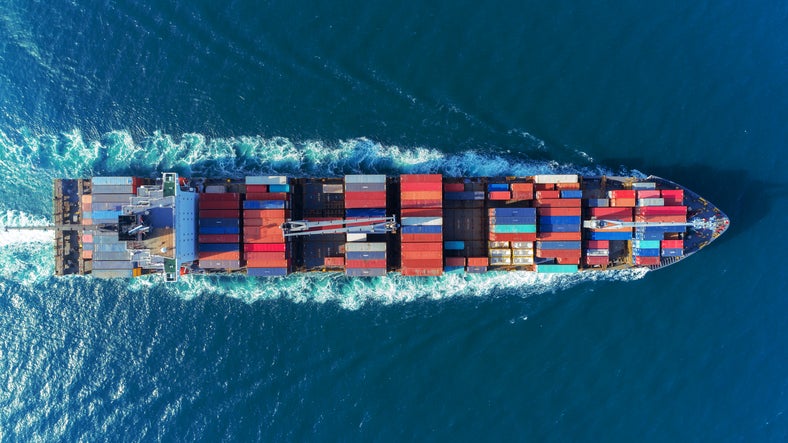
Freight companies including MSC, Hapag-Lloyd and CMA CGM Group are avoiding the Suez Canal and Red Sea until the passage is deemed safe, opting instead to redirect their vessels around the Cape of Good Hope.
MSC noted that this disruption will impact the sailing schedules by several days of vessels booked for Suez transit.
Admiral Ossama Rabiee, chairman and managing director of Suez Canal Authority, stated: “The navigation through the Suez Canal flows normally as usual. Suez Canal is watching the ongoing tensions in the Red Sea closely and examining their effect on the navigation traffic through the Canal in the light of announcing some shipping lines are shifting their journies to the Cape of Good Hope route, temporarily.”
Rabiee stressed that the Suez Canal will remain the fastest and shortest route as the saved time for the vessels transiting the Canal between Asia and Europe would reach from 9 days to 2 weeks according to the port of origin and port of destination.
According to news agency Reuters, about 15% of world shipping traffic transits via the Suez Canal, the shortest shipping route between Europe and Asia.
Reuters highlighted that following the attacks, London’s marine insurance market widening the area in the Red Sea it deemed high risk on Monday, adding to premiums ships pay.

US Tariffs are shifting - will you react or anticipate?
Don’t let policy changes catch you off guard. Stay proactive with real-time data and expert analysis.
By GlobalDataGlobalData analyst Neil Saunders echoed the same sentiment, adding that the situation makes shipping more costly thanks to higher insurance costs and the disruption of having to reroute vessels, ultimately pushing up prices or reducing margins.
Red sea disruption will have global supply chain implications
Dr Sheng Lu, associate professor in the Department of Fashion and Apparel Studies at the University of Delaware, believes the ongoing shipping disruptions could lead to increased shipping costs in the short to medium term, further exacerbating the already challenging landscape of rising sourcing and raw material costs for many EU-based textile and apparel manufacturers and brands.
Lu said: “The recent attacks on ships in the Red Sea are very concerning to the fashion industry, which depends on global trade. Notably, the Suez Canal is a key route for vessels traversing between Asia and Europe. This implies that the resulting shipping disruptions could impact millions of daily EU apparel imports from Asia, with limited practical alternatives at least in the short term.”
However, he said the incident “underscores the vulnerability” of global trade amid geopolitical tensions, which could encourage fashion companies to prioritise sourcing flexibility and diversification as strategic responses to navigate the uncertainties in the business environment.
Gherzi Textile Organisation partner, Robert P. Antoshak recollects last year when a container ship got stuck in the Suez Canal which led to supply chain disruptions until the ship was ultimately dislodged.
He points to the same “fragility” of the trading system as Lu, saying that the bottom line for the trading system, buyers and sellers is “cost.”
Antoshak noted: “Now, we have missiles and random attacks that stand to disrupt trade once again. Prices will be affected as long as the uncertainty in the region reigns supreme. And, of course, oil shipments stand to be disrupted, which could invigorate inflationary pressures. Already shipments are being diverted abound the Africa. Disruptions in the Red Sea have global implications.”
Andrew Opie, director of food & sustainability at the British Retail Consortium (BRC), also cautioned the Rea Sea situation could mean some delays on the supply of products coming from the Far East however, he added it will not have any impact on Christmas gifts which are already in the UK.
Opie pointed out that in the longer terms, some goods may take longer to be shipped due to rerouting but it is unlikely to affect the food imports which tend to come in via the EU.
A spokesperson from Swedish fashion brand H&M chose not to go into details but said: “What we can say is that we have a lot of experience in working with logistics and cannot see that we at this time will have any significant disruptions in the shipment of our collections.”
Just Style understands that while the European Apparel and Textile Confederation (EURATEX) has no official position regarding the matter, it is looking into all events across the Middle East and the disruptions in global supply chains with great concern, and would likely favour any intervention that the EU and NATO would deem appropriate to safeguard the choke points around the world, especially in areas of proximity to Europe and the north Atlantic.
The current crisis in the Red Sea accompanied with restrictions on ship movement in the Panama Canal only worsen the ongoing situation with fashion apparel industry onlookers awaiting an intervention to accelerate the clogged supply chain.



